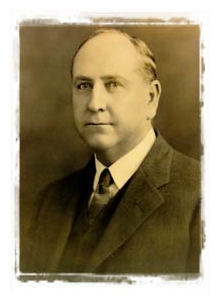 |
Philip Collier (1873-1948)
Philip Collier was Premier of Western Australia from 1924 to
1930 and from 1933 to 1936. Born at Woodstock, near Melbourne, Collier came
to Western Australia in 1904 to work for the Perseverance Gold Mining Company
at Boulder.
After earlier involvement with Labor politics in Victoria, Collier was active
in the Amalgamated Worker's Association, becoming a vice-president of the
goldfields Trades and Labor Council in 1905. Later that year he was elected
to the Legislative Assembly as the member for Boulder, a seat he would hold
until his retirement in 1947. He served as a minister in the Scaddan Government
(1911-16) and was forthright in his opposition to conscription during the
referendum campaigns which split the Labor Party.
 In 1917 Collier became Leader of the Opposition and under him the Labor Party in Western Australia overcame its internal divisions. Following a narrow victory in the 1924 election he presided over a capable and efficient government which differed little from its predecessor in its emphasis on rural development. The Group Settlement Scheme to assist British immigrants to settle in the State's south-west continued despite some opposition from within his party. During the late 1920s Collier had to accept diminished independence for the State resulting from the end of per capita payments by the Commonwealth and the financial agreement of 1928.
In 1917 Collier became Leader of the Opposition and under him the Labor Party in Western Australia overcame its internal divisions. Following a narrow victory in the 1924 election he presided over a capable and efficient government which differed little from its predecessor in its emphasis on rural development. The Group Settlement Scheme to assist British immigrants to settle in the State's south-west continued despite some opposition from within his party. During the late 1920s Collier had to accept diminished independence for the State resulting from the end of per capita payments by the Commonwealth and the financial agreement of 1928.
With the first effects of the worldwide economic Depression only just starting to be felt around the world, Collier's defeat by Mitchell in the 1930 election spared him the difficult task of coping with the mass unemployment, budgetary restrictions and community unrest which marked the next three years.
In April 1933 the Labor Party swept to a landslide victory on the same day
that 68% of Western Australians voted to secede from the Australian Commonwealth.
Like most Labor members Collier was opposed to secession - he had campaigned
unsuccessfully in favour of a constitutional convention to examine the grievances
of the smaller claimant States. Respecting the referendum result he appointed
a delegation of secession leaders to present a petition to the British Parliament,
which was rejected in 1935. By that time, however, the economy had improved
and the secession movement had lost momentum.
|
 |